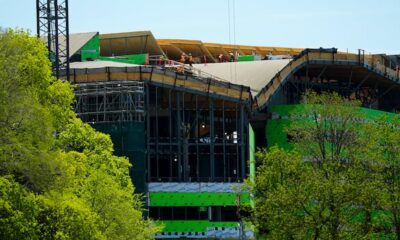Politics
Ottawa Mayor Faces Housing Dilemma Amid Golf Course Controversy

The ongoing battle over the redevelopment of the Kanata Golf and Country Club in Ottawa has reached a critical juncture as the city exhausts its legal options against the plan proposed by Clublink and its partners, Minto and Richcraft. The project, which includes plans for 1,500 new homes, has faced staunch opposition from local residents and city officials alike, despite the developers’ commitment to preserve 33 percent of the site as public parkland.
Legal Battles and Political Ramifications
Since 2019, Ottawa has been fighting this redevelopment, aiming to uphold a 1981 agreement that purportedly guarantees the golf course’s preservation “in perpetuity.” However, the city’s efforts have been thwarted in multiple courts, including the Ontario Superior Court, the Ontario Land Tribunal, and the Ontario Court of Appeal. Most recently, on March 5, 2024, the Supreme Court of Canada declined to hear an appeal from the city, solidifying the lower courts’ decisions.
Mayor Mark Sutcliffe now finds himself navigating a politically sensitive issue. His administration had initially hoped that the courts would recognize the citizens’ concerns, but with legal avenues exhausted, Sutcliffe has adopted a strategy of obstruction. He has indicated that the city will block the necessary access to infrastructure such as roads, sewers, and water pipes needed for the development to proceed.
This stance is particularly puzzling given Sutcliffe’s recent announcement of a housing plan aimed at addressing Ottawa’s housing shortage. Critics argue that his opposition to the golf course redevelopment contradicts his own housing goals. As one local resident noted, “The mayor favors more housing, unless it will damage people’s view of a private golf course.”
Community Concerns and Political Commentary
Residents living adjacent to the golf course have expressed strong dissent towards the proposed development, citing concerns that their property values could decline. Many purchased homes with the understanding that the golf course would remain intact. Political pressure is mounting as the community demands answers regarding the city’s substantial expenditures in legal fees to halt the development.
During recent comments, Ontario Premier Doug Ford appeared to straddle both sides of the issue. Initially advocating for a compromise between the city and developers, he later expressed support for Sutcliffe’s intent to block the project, stating, “If they don’t want it, they shouldn’t do it… Good for him. He’s protecting his community.” His remarks reflect the broader provincial push for increased housing, complicating the already contentious situation.
As discussions continue, the future of the Kanata Golf and Country Club remains uncertain. The city is poised to face further scrutiny at the Ontario Land Tribunal, where the developers could argue that the city is not allowing their plan a fair opportunity for consideration. Observers are questioning whether Sutcliffe’s current tactics will ultimately serve the community’s best interests or hinder the necessary housing developments Ottawa desperately needs.
With the city’s legal battles and political dynamics evolving, it is evident that the debate over the Kanata Golf and Country Club will have lasting implications for housing policy and community relations in Ottawa.
-

 Politics4 weeks ago
Politics4 weeks agoSecwepemc First Nation Seeks Aboriginal Title Over Kamloops Area
-

 World5 months ago
World5 months agoScientists Unearth Ancient Antarctic Ice to Unlock Climate Secrets
-

 Entertainment5 months ago
Entertainment5 months agoTrump and McCormick to Announce $70 Billion Energy Investments
-

 Science5 months ago
Science5 months agoFour Astronauts Return to Earth After International Space Station Mission
-

 Lifestyle5 months ago
Lifestyle5 months agoTransLink Launches Food Truck Program to Boost Revenue in Vancouver
-

 Technology3 months ago
Technology3 months agoApple Notes Enhances Functionality with Markdown Support in macOS 26
-

 Lifestyle3 months ago
Lifestyle3 months agoManitoba’s Burger Champion Shines Again Amid Dining Innovations
-

 Top Stories2 months ago
Top Stories2 months agoUrgent Update: Fatal Crash on Highway 99 Claims Life of Pitt Meadows Man
-

 Politics4 months ago
Politics4 months agoUkrainian Tennis Star Elina Svitolina Faces Death Threats Online
-

 Sports5 months ago
Sports5 months agoSearch Underway for Missing Hunter Amid Hokkaido Bear Emergency
-

 Politics5 months ago
Politics5 months agoCarney Engages First Nations Leaders at Development Law Summit
-

 Technology5 months ago
Technology5 months agoFrosthaven Launches Early Access on July 31, 2025





















